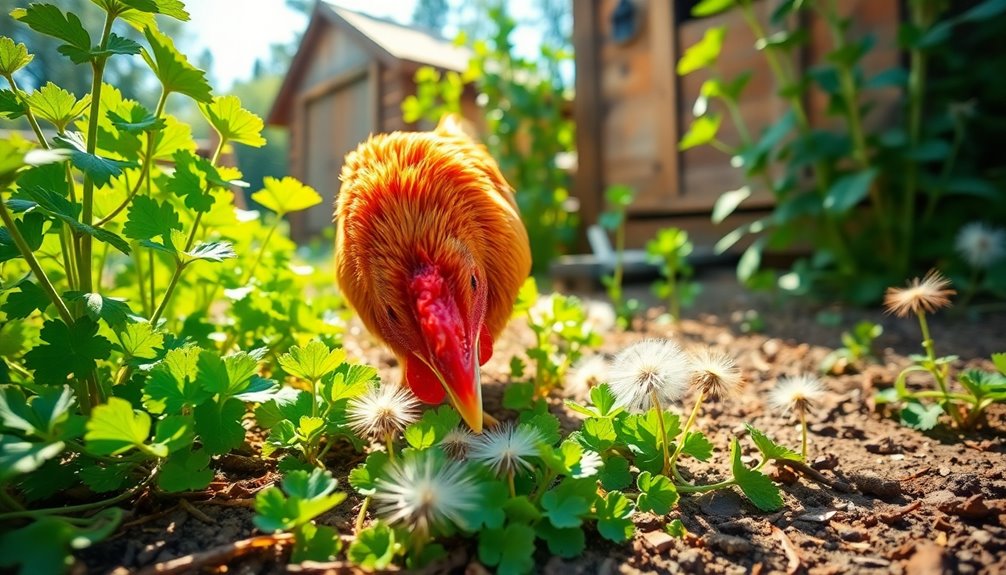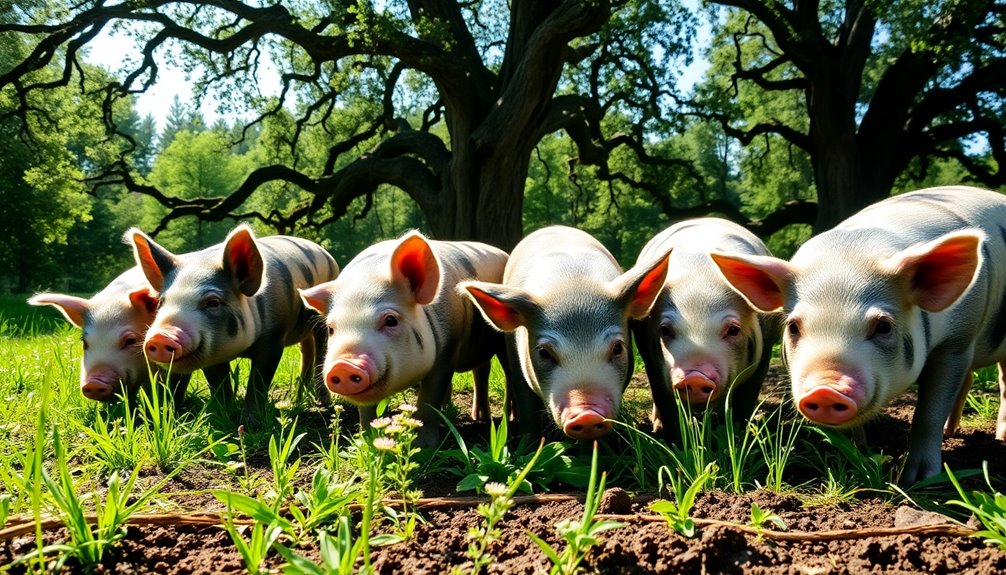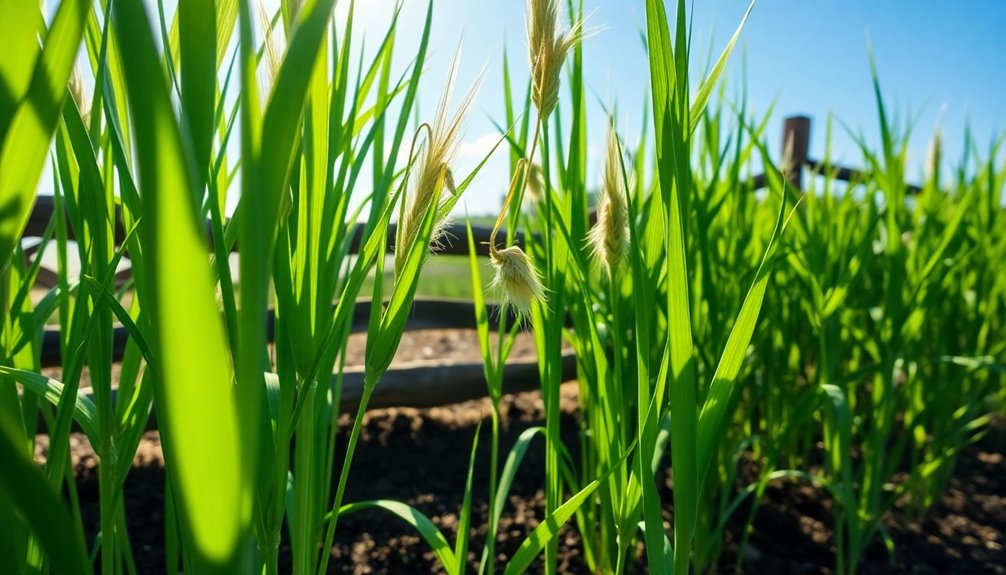Yes, forage is excellent for chickens! It enriches their diet with insects, seeds, and greens, packing in crucial nutrients. You'll find that foraging increases their Vitamin E levels, boosting egg quality considerably. Chickens also benefit from natural behaviors when foraging, which reduces stress and boredom. Sunlight helps them synthesize Vitamin D, essential for strong bones and shells. Plus, foraging can lower your feed costs by up to 20%. By ensuring a varied foraging environment, you can enhance their health even further. Interested in uncovering even more benefits? There's plenty more to explore!
Key Takeaways
- Foraging enhances chicken diets with diverse insects and greens, improving overall nutrition.
- Chickens raised on forage have 23% higher Vitamin E levels, boosting egg quality.
- Sunlight exposure from foraging aids Vitamin D synthesis, supporting strong bones and eggshells.
- Foraging reduces feed costs by 5-20%, making it a cost-effective feeding strategy.
- Rotating foraging locations promotes exercise, reduces stress, and supports natural behaviors in chickens.
Benefits of Foraging for Chickens
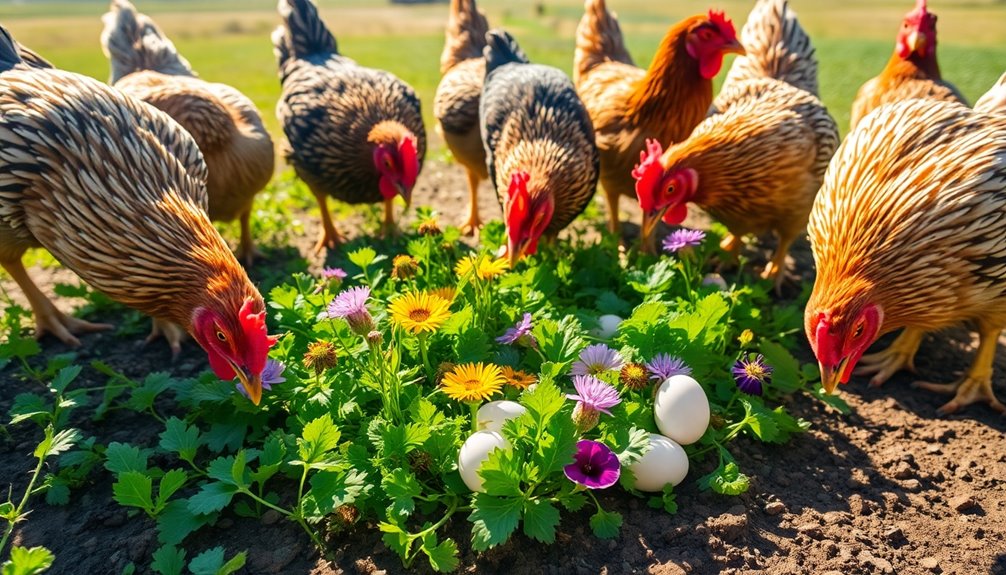
Foraging offers a wealth of benefits for chickens, enhancing their diet and overall health. When you allow your chickens to forage, they consume a diverse array of insects, seeds, and greens, which considerably boosts their nutritional value.
Pastured chickens that forage tend to produce eggs with 2-3 times more Vitamin E and higher levels of omega-3 fatty acids compared to those fed solely on commercial feed. This not only improves the quality of the eggs but also meets their protein needs more effectively.
Engaging in foraging behavior caters to their natural instincts, reducing stress and boredom, which contributes to healthier flocks. Access to sunlight during foraging also helps chickens synthesize Vitamin D, essential for maintaining strong bones and preventing deformities.
By incorporating foraging into their routine, you can help bolster their immune system, ensuring they're more resilient to diseases. Additionally, foraging can decrease feed costs, as chickens can obtain 5-20% of their nutritional needs directly from pastures, especially during peak growth seasons.
Nutritional Contributions From Forages
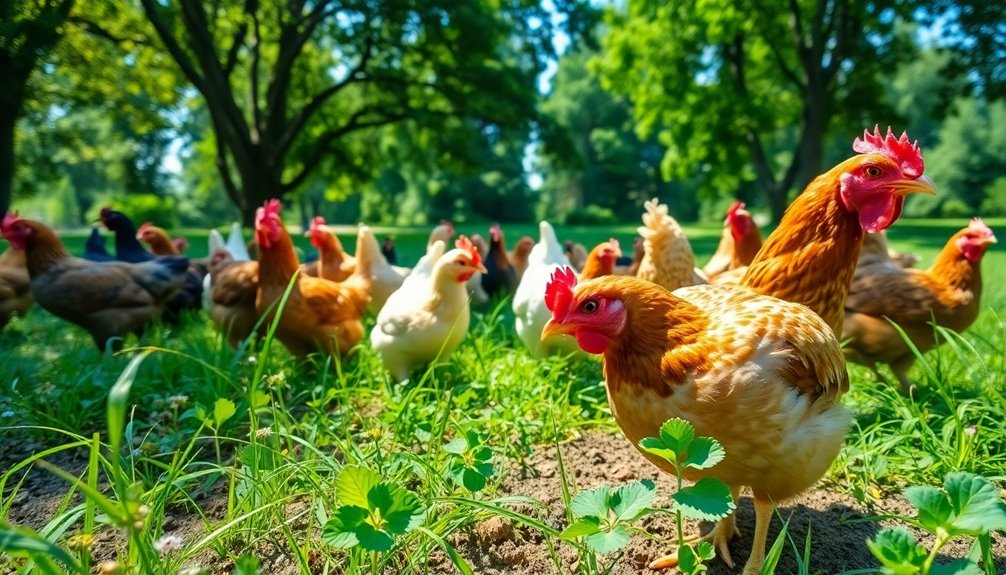
Chickens that roam and forage on pastures experience a notable boost in their nutritional intake. By allowing your flock to engage in pasture foraging, you're enhancing their overall health and egg quality.
Forage consumption provides essential nutrients that commercial feeds may lack. Here are some key benefits of foraging:
- Increased Vitamin E: Forage-raised chickens can achieve 23% higher vitamin E levels, essential for immune function and egg quality.
- Diverse Nutritional Sources: Foraging allows them to consume a variety of plants and insects, improving their diet's diversity.
- Higher Amino Acids: The consumption of insects contributes to higher methionine levels, an important amino acid necessary for preventing cannibalism.
- Omega-3 Fatty Acids: Forages rich in omega-3s improve overall flock health and enhance the nutritional profile of the eggs.
Incorporating forage into your chickens' diet not only reduces reliance on commercial feed but also markedly boosts their nutritional intake.
This results in healthier, happier birds and better-quality eggs, making pasture foraging a win-win for both you and your flock.
Sunlight's Role in Chicken Health
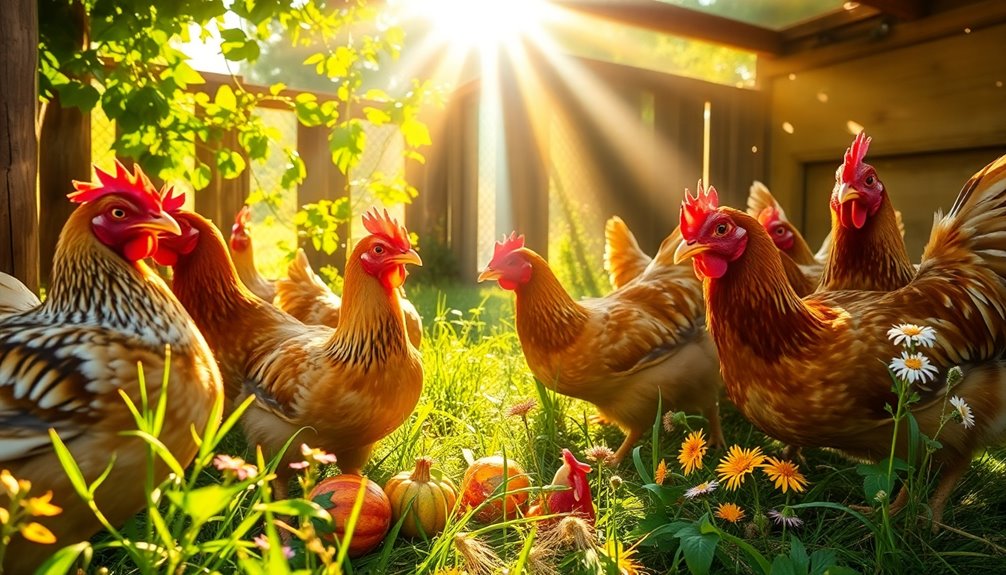
While many factors contribute to chickens' overall health, sunlight plays a crucial role in their wellbeing. When chickens have access to sunlight, they can synthesize vitamin D, which is necessary for their bone health and mobility. A deficiency in vitamin D can lead to serious conditions like rickets, negatively impacting their development and overall wellbeing.
Foraging in the sun not only helps chickens produce their own vitamin D but also reduces the need for supplemental feeds that are often fortified with this vitamin. Additionally, sunlight enhances the absorption of calcium and phosphorus in hens, which is essential for strong eggshell formation. This means healthier eggs for you!
Sunlight exposure also promotes natural behaviors in chickens, allowing them to exhibit instincts like foraging and roaming freely. These activities lead to reduced stress levels and improved chicken health.
When chickens are free to soak up the sun, they enjoy a more balanced and enriched life, ultimately benefiting you with better eggs and happier birds. So, make sure your flock has plenty of sunlight; it's a game-changer for their health!
Choosing Quality Forages

When it comes to selecting quality forages for your flock, it's vital to prioritize plants that can withstand the wear and tear of pecking and scratching. This guarantees sustainability and keeps your chickens healthy.
Here are some key factors to take into account:
- Nutritional Value: Look for forages that provide essential nutrients. Legumes can offer about 20-24% crude protein, while grasses can reach up to 20% during spring and summer.
- Insect Attraction: Choose a diverse plant selection that attracts insects, as they add essential nutrients and enhance the foraging experience for your chickens.
- Recovery Capabilities: Select forages that can regrow after being grazed, guaranteeing continuous access to fresh food sources.
- Regular Testing: Conduct forage testing to assess quality and nutrition, avoiding harmful plants like buckwheat and tall fescue, which can negatively impact chicken health and egg quality.
Managing Foraging Behavior
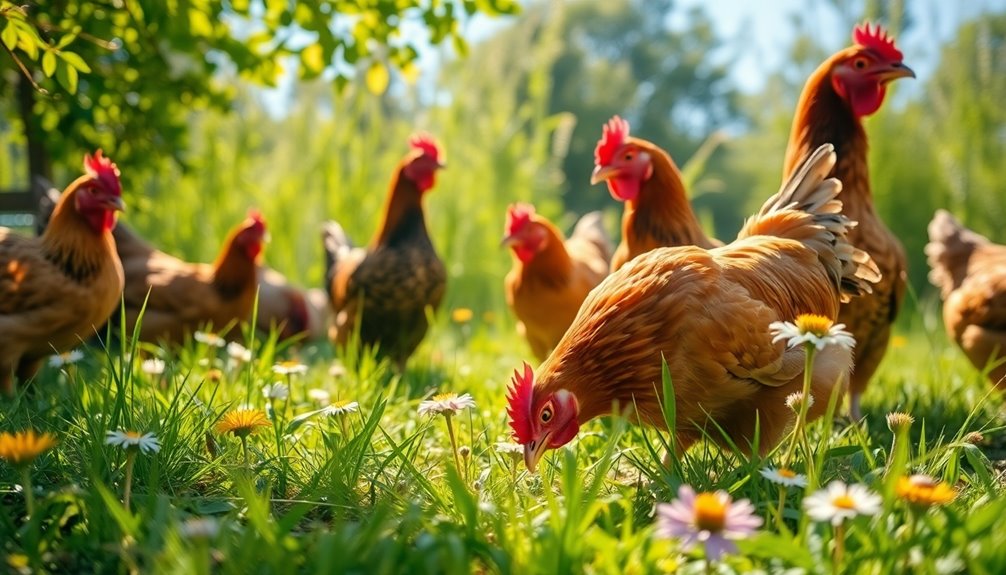
Encouraging natural foraging behavior in your flock can greatly enhance their health and well-being. Chickens need to explore their environment to engage in foraging behaviors that promote a diverse diet, which is essential for peak nutritional intake. Providing ample space allows them to forage on pasture, increasing exercise and reducing stress.
To effectively manage foraging behavior, consider these key factors:
| Factor | Importance |
|---|---|
| Seasonal Availability | Rotate foraging locations to guarantee a consistent nutrient supply. |
| Environmental Enrichment | Incorporate diverse food sources and shelter to support instinctual behaviors. |
| Monitoring Health | Regularly observe flock behavior to identify preferences and adjust practices. |
| Peak Foraging Practices | Tailor foraging strategies to enhance overall flock health and behavior. |
Frequently Asked Questions
Is Foraging Good for Chickens?
Foraging is definitely good for chickens! When you let them roam and explore, they get to enjoy a diverse diet filled with plants, insects, and seeds.
This not only boosts their nutritional intake but also keeps them mentally stimulated and healthy. Plus, foraging can lower your feed costs while enhancing egg quality.
With access to sunlight, your chickens can synthesize vitamin D, promoting better bone health and overall wellness.
What Can I Feed My Chickens to Make Eggs More Nutritious?
If you want your chickens to lay eggs that are nothing short of a nutritional miracle, think about diversifying their diet!
Feed them forages like clover, alfalfa, and mixed grasses. These greens boost omega-3 fatty acids and vitamins A and E, making their eggs healthier.
Don't forget insects, too—they're packed with essential amino acids.
Regular access to fresh forages also helps with vitamin D, promoting better bone health and egg production.
What Is the Best Forage for Chickens?
When you're choosing the best forage for your chickens, consider options like alfalfa and clover.
These provide essential nutrients and protein, boosting their health and egg quality. Mixed cool-season grasses can enhance omega-3 fatty acids in their eggs, which is a plus!
Just make sure to avoid harmful forages like buckwheat and tall fescue KY 31, as they can negatively affect your chickens' well-being and the quality of their eggs.
What to Feed Chickens to Strengthen Egg Shells?
To strengthen your chickens' eggshells, focus on a diet rich in calcium by adding crushed oyster shells or limestone.
Don't forget to include high-quality protein sources, like insects or fortified feeds, to support overall hen health.
Confirm they get plenty of sunlight for vitamin D, which helps calcium absorption.
Regularly providing a balanced mix of greens, grains, and protein will lead to healthier hens and stronger eggshells.
Conclusion
Incorporating foraging into your chickens' diet can greatly boost their health and egg production. Did you know that hens that forage can produce up to 20% more eggs than those that rely solely on commercial feed? By choosing quality forages and allowing them to roam in sunlight, you're not just enhancing their nutrition but also promoting their natural behaviors. So, let your chickens indulge in foraging, and watch as they thrive and reward you with those egg-ceptional eggs!

